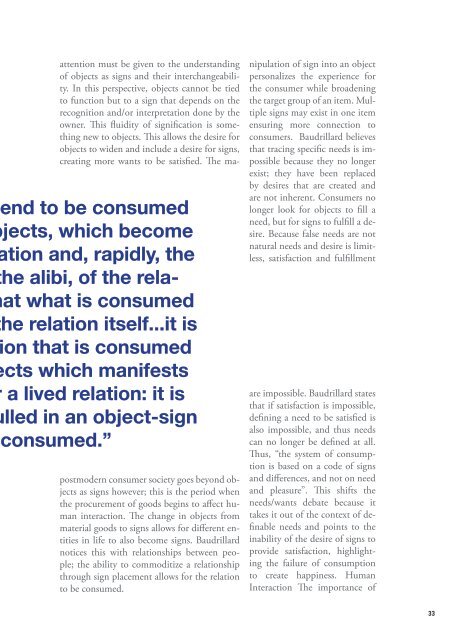Publication (142 pages).
Create successful ePaper yourself
Turn your PDF publications into a flip-book with our unique Google optimized e-Paper software.
tend to be consumed<br />
bjects, which become<br />
iation and, rapidly, the<br />
, the alibi, of the relathat<br />
what is consumed<br />
the relation itself...it is<br />
tion that is consumed<br />
jects which manifests<br />
er a lived relation: it is<br />
ulled in an object-sign<br />
s consumed.”<br />
postmodern consumer society goes beyond objects<br />
as signs however; this is the period when<br />
the procurement of goods begins to affect human<br />
interaction. The change in objects from<br />
material goods to signs allows for different entities<br />
in life to also become signs. Baudrillard<br />
notices this with relationships between people;<br />
the ability to commoditize a relationship<br />
through sign placement allows for the relation<br />
to be consumed.<br />
attention must be given to the understanding<br />
of objects as signs and their interchangeability.<br />
In this perspective, objects cannot be tied<br />
to function but to a sign that depends on the<br />
recognition and/or interpretation done by the<br />
owner. This fluidity of signification is something<br />
new to objects. This allows the desire for<br />
objects to widen and include a desire for signs,<br />
creating more wants to be satisfied. The manipulation<br />
of sign into an object<br />
personalizes the experience for<br />
the consumer while broadening<br />
the target group of an item. Multiple<br />
signs may exist in one item<br />
ensuring more connection to<br />
consumers. Baudrillard believes<br />
that tracing specific needs is impossible<br />
because they no longer<br />
exist; they have been replaced<br />
by desires that are created and<br />
are not inherent. Consumers no<br />
longer look for objects to fill a<br />
need, but for signs to fulfill a desire.<br />
Because false needs are not<br />
natural needs and desire is limitless,<br />
satisfaction and fulfillment<br />
are impossible. Baudrillard states<br />
that if satisfaction is impossible,<br />
defining a need to be satisfied is<br />
also impossible, and thus needs<br />
can no longer be defined at all.<br />
Thus, “the system of consumption<br />
is based on a code of signs<br />
and differences, and not on need<br />
and pleasure”. This shifts the<br />
needs/wants debate because it<br />
takes it out of the context of definable<br />
needs and points to the<br />
inability of the desire of signs to<br />
provide satisfaction, highlighting<br />
the failure of consumption<br />
to create happiness. Human<br />
Interaction The importance of<br />
33


